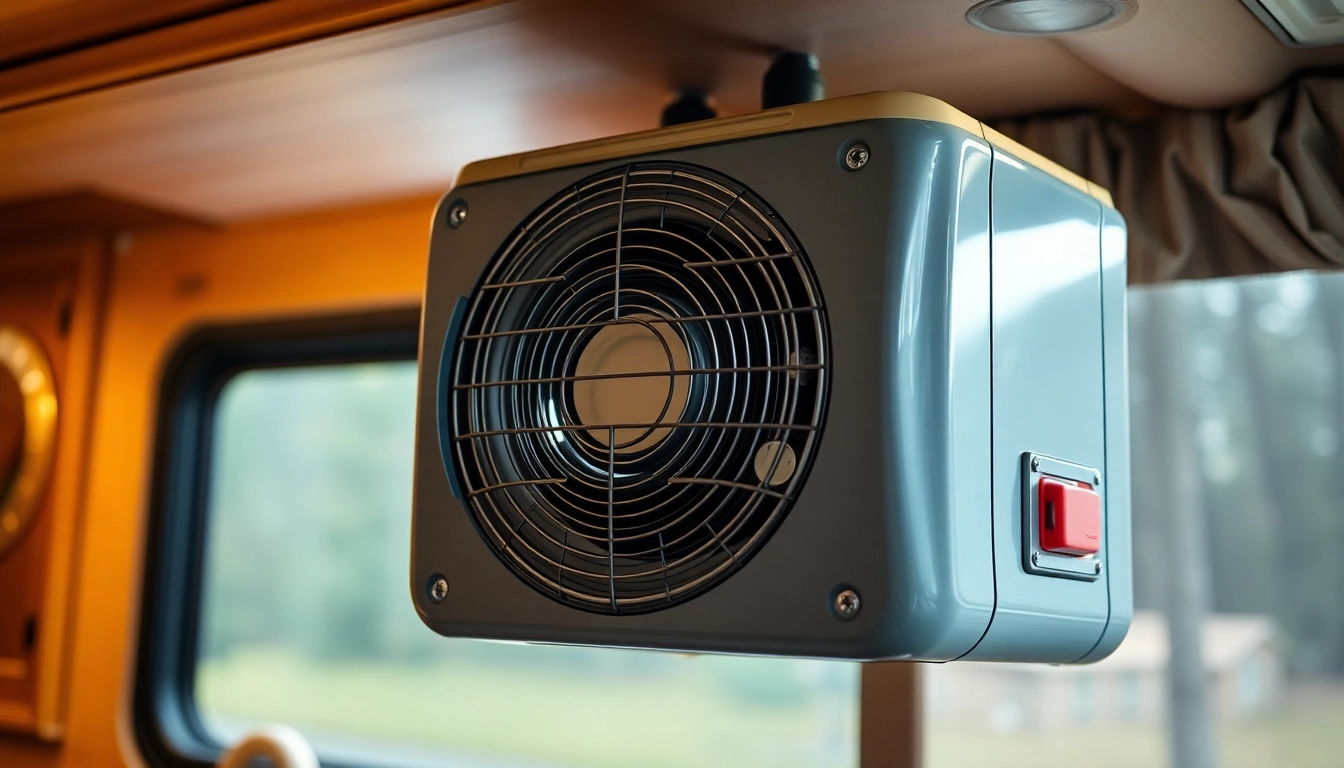Understanding Diesel Air Heaters
What is a Diesel Air Heater?
A diesel air heater is a specialized heating device that utilizes diesel fuel to generate warmth efficiently. Designed primarily for applications requiring quick heating in vehicles and various indoor/outdoor spaces, these heaters are popular among RV enthusiasts, truck drivers, and those needing supplementary heating for garages, workshops, or even residential spaces. Unlike conventional heating solutions, a diesel air heater is portable and often features a compact design, making it suitable for mobile or temporary installations.
How Diesel Air Heaters Work
Diesel air heaters operate through a simple yet effective principle. The process begins with the diesel fuel being drawn from an external tank. The heater then pumps the diesel through a combustion chamber where it is ignited. The resulting hot gases circulate through a heat exchanger, transferring warmth to the incoming air. This heated air is then blown into the space needing warmth via a fan. Most diesel air heaters are equipped with a thermostat, allowing users to set their desired temperature, ensuring efficient and controlled heating.
Key Benefits of Using Diesel Air Heaters
- Efficiency: Diesel air heaters are known for their high efficiency. They consume relatively low amounts of fuel while delivering significant heat output, especially in cold conditions.
- Portability: Many models are lightweight and designed for ease of installation, which is ideal for mobile applications such as RVs and trucks.
- Quick Heating: These heaters can heat up spaces within minutes, providing immediate relief during cold weather.
- Reliability: Diesel air heaters are engineered to function effectively even in extreme temperatures, making them a reliable choice for outdoor enthusiasts.
- Low Noise Levels: Modern diesel heaters are designed with innovative technology that reduces operational noise, making them suitable for camping, residential, or work environments.
Types of Diesel Air Heaters
Portable Diesel Air Heaters
Portable diesel air heaters are ideal for those needing flexible heating solutions. They can be moved between locations, making them suitable for camping, job sites, or seasonal use in different areas. Many models are powered by 12V batteries, allowing them to operate in RVs or trucks without needing a direct electrical connection. Their versatility and ease of use make them a favorite among outdoor enthusiasts.
Fixed Diesel Air Heating Systems
On the other hand, fixed diesel air heaters are installed in a specific location and typically serve larger spaces or buildings. These systems are more complex and may involve ductwork to distribute heat evenly. Fixed units often provide higher heating capacities, making them suitable for garages, workshops, and other larger areas where consistent heat is necessary.
Choosing Between Different Models
When selecting a diesel air heater, it is crucial to consider factors such as heating capacity (measured in BTUs), the type of installation (portable vs. fixed), and additional features like remote control functionality or digital displays. Investing in a high-quality heater from reputable brands ensures reliability and longevity. Compare different models, read customer reviews, and examine warranty offerings before making a purchase.
Installation and Maintenance of Diesel Air Heaters
How to Install a Diesel Air Heater
Installing a diesel air heater can vary based on whether it is a portable or fixed model, but generally, here are the steps involved in the installation process:
- Location Selection: Choose a proper location providing adequate airflow and safety away from flammable materials.
- Mounting: Use the appropriate mounting hardware to securely attach the heater to the selected surface.
- Plumbing: Connect the fuel line to the diesel tank, ensuring leak-proof connections.
- Wiring: Connect the heater to a power source if required, making sure all electrical connections are secure and insulated.
- Test the System: Before putting it into full operation, test the heater for proper function, checking for leaks and ensuring the fan and thermostat work correctly.
Maintenance Tips for Longevity
Regular maintenance is critical to ensuring that your diesel air heater remains efficient and operational. Key maintenance tasks include:
- Cleaning: Routinely clean the combustion chamber and air filters to prevent clogs and ensure efficient operation.
- Check Connections: Inspect fuel lines and electrical connections for wear or damage and replace any faulty components.
- Fuel Quality: Use high-quality diesel to reduce the risk of clogging and ensure optimal performance.
- Regularly Schedule Inspections: If professionally maintained, set up an annual inspection to catch any potential issues early.
Common Issues and Troubleshooting
Even reliable machines can experience issues. Some common problems with diesel air heaters include:
- Failure to Start: This could be due to a lack of fuel, a dead battery, or electrical failure. Check all connections and the fuel supply.
- Uneven Heating: This might be caused by blockages in the air intake or exhaust. Regular cleaning should keep these passages clear.
- Strange Noises: Unusual sounds may indicate a loose component or mechanical failure. Investigate and tighten any loose parts.
Optimizing Efficiency and Performance
Fuel Consumption Tips
To maximize the efficiency of your diesel air heater and reduce fuel consumption:
- Maintain Proper Insulation: Ensure the spaces you are heating are well-insulated to retain heat longer and decrease the workload on your heater.
- Set Temperatures Wisely: Avoid setting the temperature higher than necessary. Using programmable thermostats can help maintain consistent temperatures while optimizing fuel usage.
- Choose a Quality Filter: A quality air filter can significantly affect combustion and thus improve overall efficiency.
Maximizing Heat Output
To ensure your diesel air heater provides maximum heat output:
- Correct Sizing: Choose a heater appropriate for the space you are using it in. An undersized heater will struggle to provide enough warmth, while an oversized unit may waste fuel.
- Regular Maintenance: Adhering to the previously mentioned maintenance schedule will keep your heater in peak working condition.
- Advanced Features: Consider models with features such as auto shut-off, multistage heating, or weather compensation controls that allow for better adaptability to external conditions.
Best Practices for Diesel Heater Usage
Employing best practices in the usage of diesel air heaters includes:
- Preheating: If your heater has a preheat function, use it to prepare the space before use.
- Monitoring: Keep an eye on fuel levels and operational indicators to prevent running out of fuel unexpectedly.
- Scheduling Usage: To save fuel, plan your heating in accordance with when you’ll require it most—just heating during peak usage times can save costs.
Comparative Analysis of Popular Diesel Air Heaters
VEVOR Diesel Air Heaters Review
VEVOR offers a range of diesel air heaters well-regarded for their performance and efficiency. For example, their 5KW 12V parking heater stands out due to its rapid heat generation capabilities, even in extreme cold conditions. Users have often praised their quiet operation and user-friendly controls, making them ideal for both indoor and outdoor applications. Regular reviews indicate a high level of satisfaction, particularly among RV owners and truck drivers.
Comparing Budget vs. Premium Models
When evaluating budget diesel air heaters against premium options, there are a few considerations to keep in mind:
- Initial Cost: Budget models may save money upfront, but their longevity and efficiency in fuel usage can lead to higher long-term costs.
- Features: Premium models often come with advanced features such as remote control, improved fuel efficiency, and longer warranty periods.
- Performance: While budget options may suffice for short-term needs, investing in a premium model can enhance reliability, especially in challenging conditions.
User Testimonials and Recommendations
User testimonials often highlight the importance of purchasing from reputable brands and considering professional installation for more complex systems. Many users recommend thoroughly reviewing heating output requirements before selecting a model, suggesting that potential buyers take their specific use-case scenarios into account. Additionally, forums and community groups centered around RV or camping enthusiasts are valuable for gathering feedback and advice on specific models.



